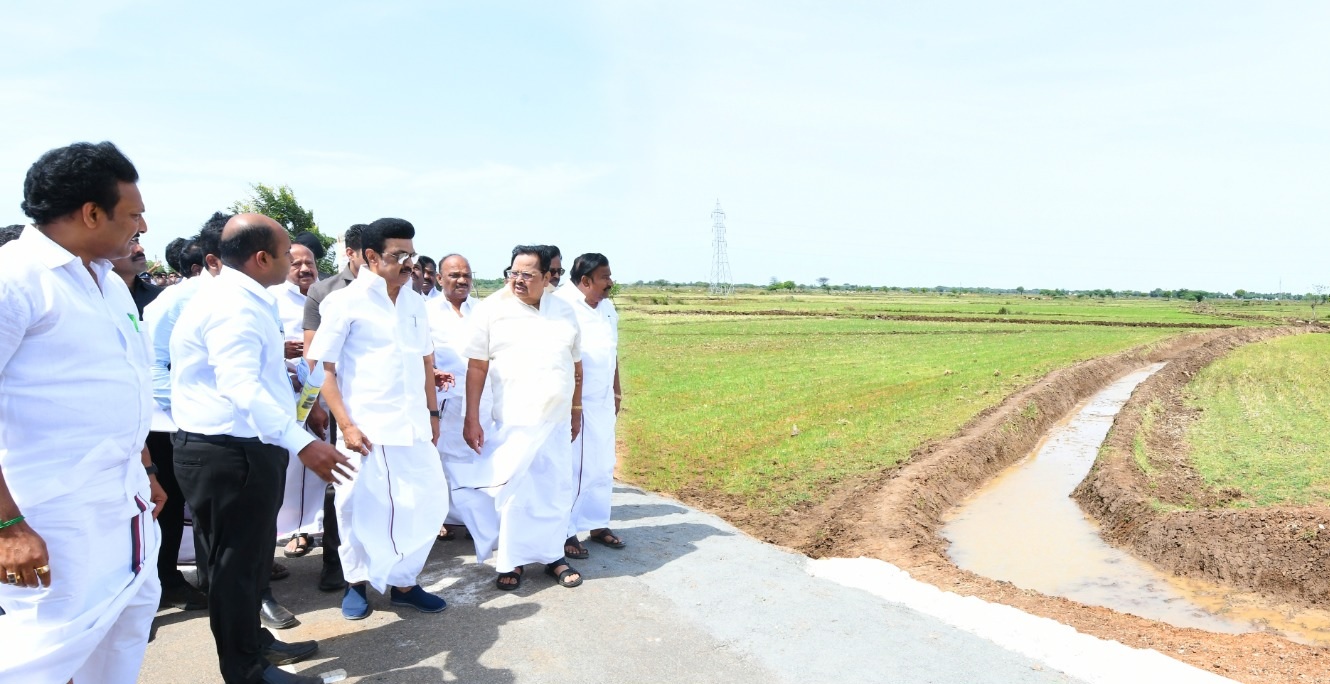Stalin also confirmed his participation in the all-Opposition party meeting organised by Bihar Chief Minister Nitish Kumar on 23 June.

On a two-day trip to Tiruchy and Thanjavur, Stalin inspected the desilting works of the water bodies and the irrigation channels. (Supplied)
Tamil Nadu Chief Minister MK Stalin has said that his government will oppose any move on the construction of a dam at Mekedatu in Karnataka.
While on a day trip to the Delta districts of Thanjavur and Tiruchy on Friday, 9 June, Stalin told reporters that he would firmly oppose the construction of a reservoir at Mekedatu.
“We opposed the initiative of the dam construction when the previous BJP government in Karnataka was in power and now also we are firm in the same stand, toeing the line of former Chief Minister M Karunanidhi,” Stalin said.
#Live: செய்தியாளர் சந்திப்புhttps://t.co/NShJkD4g2s
— M.K.Stalin (@mkstalin) June 9, 2023
Explaining the hike in electricity tariff of industrial connections, Stalin said that when the late J Jayalalithaa was hospitalised, the then-ruling AIADMK government had signed the Uday Electricity Scheme, which he claimed was the root cause for the hike in the electricity tariff.
“We have not raised the tariff to the residential power supply. Except for a few, the industrialists in the state understand the need for a hike and, compared to the other states, Tamil Nadu’s electricity tariff is low,” Stalin stated.
He also stated that efforts are being taken to reduce the number of Tasmac liquor shops and, this year, as announced, the government will close 500 liquor outlets in the state.
When asked about the possibility of any changes in his Cabinet, Stalin replied that there is a possibility of a Cabinet change at the Centre.
Stalin also confirmed that he will be participating in the all-Opposition party meeting organised by Bihar Chief Minister Nitish Kumar on 23 June.
Stalin said that the state has been creating a revolution in producing paddy, surpassing its productivity over two consecutive years. During this fiscal too, the state is expected to exceed its previous years’ productivity of the food grain.
நெற்கழனிகள் நிறைந்த என் தஞ்சை நிலம் தொடும் போதெல்லாம் மகிழ்ச்சியால் நெஞ்சம் நிறையும்! #DeltaVisit pic.twitter.com/dr4jux1hQx
— M.K.Stalin (@mkstalin) June 9, 2023
“Our government has been according priority to agriculture and also in maintaining the waterways to ensure the farmers received copious water for irrigation,” he stated.
During 2021-22, about ₹62.91 crore was allotted for desilting the canals for a distance of 3,889 km and the Mettur Dam was opened on 12 June. This resulted in bringing 4.90 lakh acres land under Kuruvai cultivation and another 13.34 lakh acres under Samba crop. This helped to achieve a record paddy production of 39.71 lakh tonnes.
“I won’t call this a record. It’s a revolution. In 2022-23, we surpassed the previous year’s area of cultivation and production to 5.36 lakh acres for Kuruvai and 13.53 lakh acres for Samba crop, leading to a production of 41.45 lakh tonnes of paddy. This was because we took up desilting work for ₹80 crore, extended crop loans to farmers, and opened the Mettur Dam on 24 May,” the chief minister said.
In the current year, the government has taken up the desilting work at an outlay of ₹90 crore and nearly 96 per cent of the work has been completed and the remaining portion would be completed soon, Stalin said.
திருச்சிராப்பள்ளி மாவட்டம் வெள்ளனூரில் உள்ள நந்தியாறு வடிகாலில் மேற்கொள்ளப்பட்டு வரும் தூர்வாரும் பணிகளை மாண்புமிகு முதலமைச்சர் @mkstalin அவர்கள் பார்வையிட்டு ஆய்வு செய்தார். pic.twitter.com/ZHap4K60S8
— CMOTamilNadu (@CMOTamilnadu) June 9, 2023
Desilting work has already been completed for a 4,773 km stretch of canals in Salem, Namakkal, Ariyalur, Perambalur, Cuddalore, Mayiladuthurai, Tiruchy, Thanjavur, Nagapattinam, Tiruvarur, and Pudukottai districts, he added.
“I will personally visit to release water from the Mettur Dam for irrigation and I hope this year too the farmers will break the previous two years’ record,” Stalin said.
On a two-day trip to Tiruchy and Thanjavur, Stalin inspected the desilting works of the water bodies and the irrigation channels.

Jul 26, 2024

Jul 26, 2024

Jul 25, 2024

Jul 21, 2024

Jul 21, 2024

Jul 21, 2024